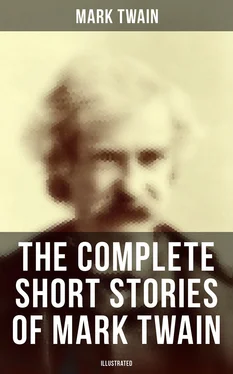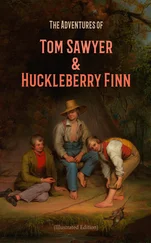Those Extraordinary Twins
Table of Contents
Table of Contents
Chapter I. The Twins as They Really Were
Chapter II. Ma Cooper Gets All Mixed Up
Chapter III. Angelo is Blue
Chapter IV. Supernatural Chronometry
Chapter V. Guilt and Innocence Finely Blent
Chapter VI. The Amazing Duel
Chapter VII. Luigi Defies Galen
Chapter VIII. Baptism of the Better Half
Chapter IX. The Drinkless Drunk
Chapter X. So They Hanged Luigi
Final Remarks
A man who is not born with the novel-writing gift has a troublesome time of it when he tries to build a novel. I know this from experience. He has no clear idea of his story; in fact he has no story. He merely has some people in his mind, and an incident or two, also a locality. He knows these people, he knows the selected locality, and he trusts that he can plunge those people into those incidents with interesting results. So he goes to work. To write a novel? No—that is a thought which comes later; in the beginning he is only proposing to tell a little tale; a very little tale; a six-page tale. But as it is a tale which he is not acquainted with, and can only find out what it is by listening as it goes along telling itself, it is more than apt to go on and on and on till it spreads itself into a book. I know about this, because it has happened to me so many times.
And I have noticed another thing: that as the short tale grows into a long tale, the original intention (or motif) is apt to get abolished and find itself superseded by a quite different one. It was so in the case of a magazine sketch which I once started to write—a funny and fantastic sketch about a prince and a pauper; it presently assumed a grave cast of its own accord, and in that new shape spread itself out into a book. Much the same thing happened with “Pudd’nhead Wilson.” I had a sufficiently hard time with that tale, because it changed itself from a farce to a tragedy while I was going along with it—a most embarrassing circumstance. But what was a great deal worse was, that it was not one story, but two stories tangled together; and they obstructed and interrupted each other at every turn and created no end of confusion and annoyance. I could not offer the book for publication, for I was afraid it would unseat the reader’s reason. I did not know what was the matter with it, for I had not noticed, as yet, that it was two stories in one. It took me months to make that discovery. I carried the manuscript back and forth across the Atlantic two or three times, and read it and studied over it on shipboard; and at last I saw where the difficulty lay. I had no further trouble. I pulled one of the stories out by the roots, and left the other one—a kind of literary Caesarean operation.
Would the reader care to know something about the story which I pulled out? He has been told many a time how the born-and-trained novelist works. Won’t he let me round and complete his knowledge by telling him how the jack-leg does it?
Originally the story was called “Those Extraordinary Twins.” I meant to make it very short. I had seen a picture of a youthful Italian “freak” or “freaks” which was—or which were—on exhibition in our cities—a combination consisting of two heads and four arms joined to a single body and a single pair of legs—and I thought I would write an extravagantly fantastic little story with this freak of nature for hero—or heroes—a silly young miss for heroine, and two old ladies and two boys for the minor parts. I lavishly elaborated these people and their doings, of course. But the tale kept spreading along, and spreading along, and other people got to intruding themselves and taking up more and more room with their talk and their affairs. Among them came a stranger named Pudd’nhead Wilson, and a woman named Roxana; and presently the doings of these two pushed up into prominence a young fellow named Tom Driscoll, whose proper place was away in the obscure background. Before the book was half finished those three were taking things almost entirely into their own hands and working the whole tale as a private venture of their own—a tale which they had nothing at all to do with, by rights.
When the book was finished and I came to look around to see what had become of the team I had originally started out with—Aunt Patsy Cooper, Aunt Betsy Hale, the two boys, and Rowena the light-weight heroine—they were nowhere to be seen; they had disappeared from the story some time or other. I hunted about and found them—found them stranded, idle, forgotten, and permanently useless. It was very awkward. It was awkward all around; but more particularly in the case of Rowena, because there was a love-match on, between her and one of the twins that constituted the freak, and I had worked it up to a blistering heat and thrown in a quite dramatic love-quarrel, wherein Rowena scathingly denounced her betrothed for getting drunk, and scoffed at his explanation of how it had happened, and wouldn’t listen to it, and had driven him from her in the usual “forever” way; and now here she sat crying and broken-hearted; for she had found that he had spoken only the truth; that it was not he, but the other half of the freak, that had drunk the liquor that made him drunk; that her half was a prohibitionist and had never drunk a drop in his life, and, although tight as a brick three days in the week, was wholly innocent of blame; and indeed, when sober, was constantly doing all he could to reform his brother, the other half, who never got any satisfaction out of drinking, anyway, because liquor never affected him. Yes, here she was, stranded with that deep injustice of hers torturing her poor torn heart.
I didn’t know what to do with her. I was as sorry for her as anybody could be, but the campaign was over, the book was finished, she was sidetracked, and there was no possible way of crowding her in, anywhere. I could not leave her there, of course; it would not do. After spreading her out so, and making such a to-do over her affairs, it would be absolutely necessary to account to the reader for her. I thought and thought and studied and studied; but I arrived at nothing. I finally saw plainly that there was really no way but one—I must simply give her the grand bounce. It grieved me to do it, for after associating with her so much I had come to kind of like her after a fashion, notwithstanding she was such an ass and said such stupid irritating things and was so nauseatingly sentimental. Still it had to be done. So, at the top of Chapter XVII, I put in a “Calendar” remark concerning July the Fourth, and began the chapter with this statistic:
“Rowena went out in the back yard after supper to see the fireworks and fell down the well and got drowned.”
It seemed abrupt, but I thought maybe the reader wouldn’t notice it, because I changed the subject right away to something else. Anyway it loosened up Rowena from where she was stuck and got her out of the way, and that was the main thing. It seemed a prompt good way of weeding out people that had got stalled, and a plenty good enough way for those others; so I hunted up the two boys and said “they went out back one night to stone the cat and fell down the well and got drowned.” Next I searched around and found old Aunt Patsy Cooper and Aunt Betsy Hale where they were aground, and said “they went out back one night to visit the sick and fell down the well and got drowned.” I was going to drown some of the others, but I gave up the idea, partly because I believed that if I kept that up it would arouse attention, and perhaps sympathy with those people, and partly because it was not a large well and would not hold any more anyway.
Still the story was unsatisfactory. Here was a set of new characters who were become inordinately prominent and who persisted in remaining so to the end; and back yonder was an older set who made a large noise and a great to-do for a little while and then suddenly played out utterly and fell down the well. There was a radical defect somewhere, and I must search it out and cure it.
Читать дальше












